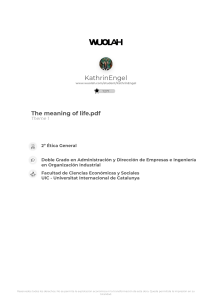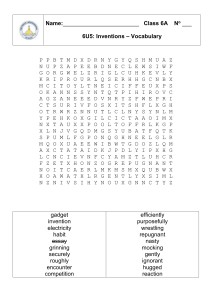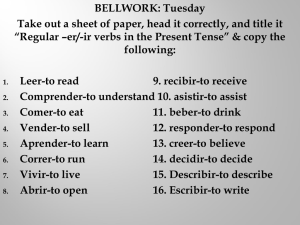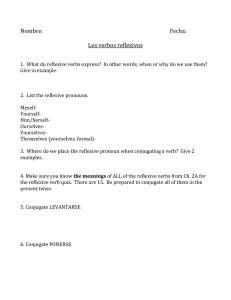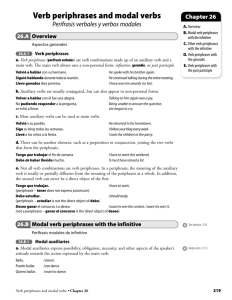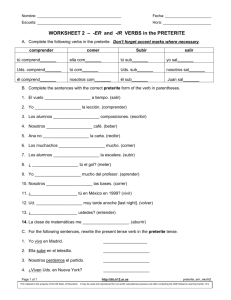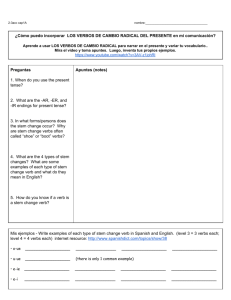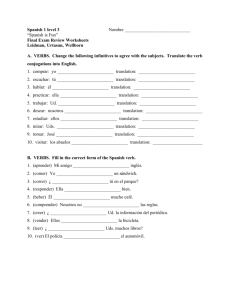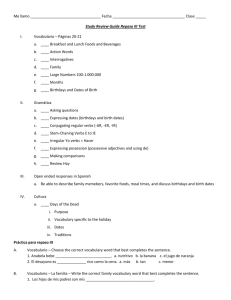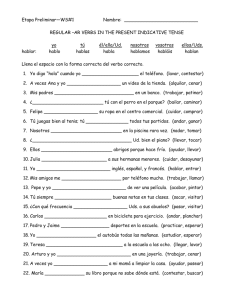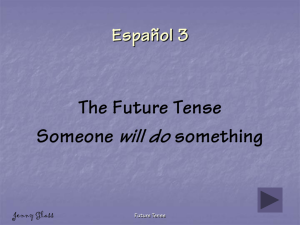AQA A2 level Spanish - Languages Resources
advertisement
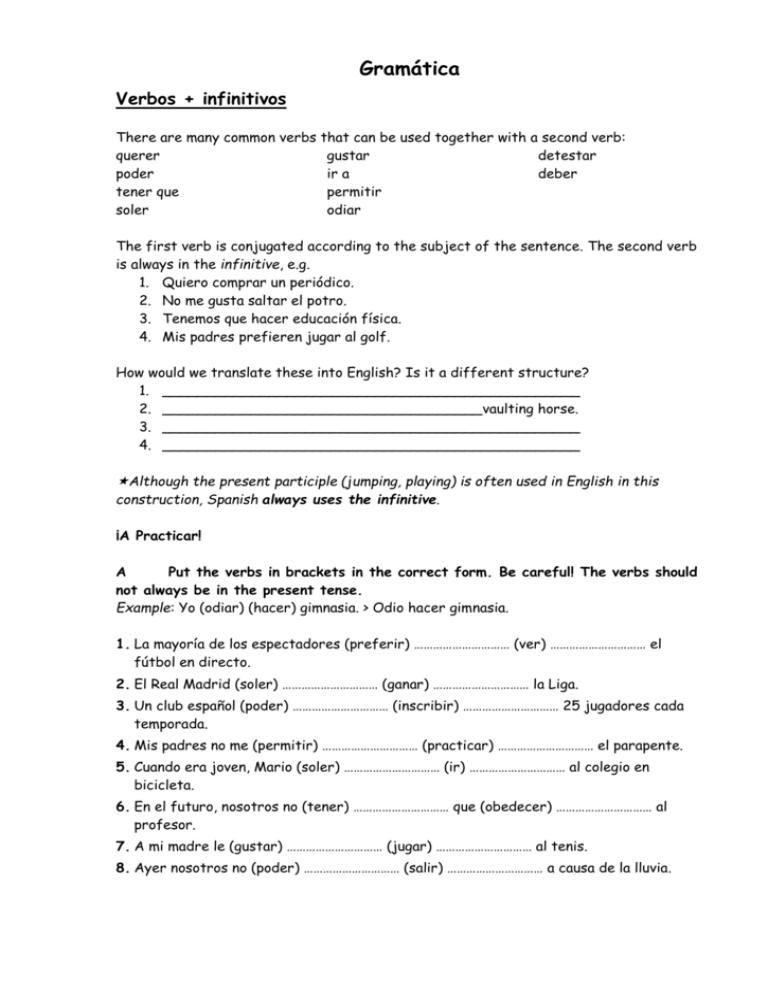
Gramática Verbos + infinitivos There are many common verbs that can be used together with a second verb: querer gustar detestar poder ir a deber tener que permitir soler odiar The first verb is conjugated according to the subject of the sentence. The second verb is always in the infinitive, e.g. 1. Quiero comprar un periódico. 2. No me gusta saltar el potro. 3. Tenemos que hacer educación física. 4. Mis padres prefieren jugar al golf. How would we translate these into English? Is it a different structure? 1. _______________________________________________ 2. ____________________________________vaulting horse. 3. _______________________________________________ 4. _______________________________________________ Although the present participle (jumping, playing) is often used in English in this construction, Spanish always uses the infinitive. ¡A Practicar! A Put the verbs in brackets in the correct form. Be careful! The verbs should not always be in the present tense. Example: Yo (odiar) (hacer) gimnasia. > Odio hacer gimnasia. 1. La mayoría de los espectadores (preferir) ………………………… (ver) ………………………… el fútbol en directo. 2. El Real Madrid (soler) ………………………… (ganar) ………………………… la Liga. 3. Un club español (poder) ………………………… (inscribir) ………………………… 25 jugadores cada temporada. 4. Mis padres no me (permitir) ………………………… (practicar) ………………………… el parapente. 5. Cuando era joven, Mario (soler) ………………………… (ir) ………………………… al colegio en bicicleta. 6. En el futuro, nosotros no (tener) ………………………… que (obedecer) ………………………… al profesor. 7. A mi madre le (gustar) ………………………… (jugar) ………………………… al tenis. 8. Ayer nosotros no (poder) ………………………… (salir) ………………………… a causa de la lluvia. Gramática 9. Aunque iba en silla de ruedas, Javier (querer) ………………………… (jugar) ………………………… al baloncesto. 10. Un buen portero no (deber) ………………………… (encajar) ………………………… tantos goles. B Translate the following sentences into Spanish. 1. Do you like playing golf? …………………………………………………………………………………………………… 2. My brother prefers watching matches on TV. …………………………………………………………………………………………………… 3. All the children have to do sport. …………………………………………………………………………………………………… 4. Diego loves surfing. …………………………………………………………………………………………………… 5. I would like to try skydiving. …………………………………………………………………………………………………… Verbos + infinitivos Completa la tabla: Inglés Español It’s important It’s necessary Es imprescindible Es preciso It’s vital Es aconsejable It’s desirable It’s unacceptable It’s easy It’s difficult Es peligroso Es útil Its normal Most of these expressions can be used in the negative simply by adding no: No es aconsejable vivir en pueblos donde haya un nivel alto de contaminación. It is not advisable to live in towns where there is a high level of pollution. You can alter the emphasis of the sentence by putting the infinitive first: Controlar las emisiones de las fábricas no es siempre fácil. Gramática Controlling emissions from factories is not always easy. They can also be used in different tenses: Será difícil concienciar a la gente de los problemas causados por el alumbramiento excesivo. It will be difficult to make people aware of the problems caused by excessive lighting. If a new subject is introduced, and que follows, you will need to use a verb in the subjunctive: No es aconsejable que los niños vivan en pueblos donde haya un nivel alto de contaminación. It’s not advisable for children to live (= that children live) in towns where there is a high level of pollution. See Student book 4.12, p. 115, on the use of the subjunctive. 1 Fill in the gaps with an appropriate infinitive: vivir tener permitir reducir respirar poner 1 Es imprescindible ........................ el nivel de ruido en las ciudades. 2 ........................la música muy fuerte es muy antisocial. 3 Es perjudicial para la salud ........................ los humos que emiten las instalaciones petroquímicas. 4 No es agradable ........................cerca de un aeropuerto. 5 Es fundamental ........................ un entorno saludable para los niños. 6 ........................ a la gente pobre trabajar en condiciones insaludables es inmoral. 2 Choose the correct ending for each of the sentences. 1 Es esencial tomar … 2 Sería mejor instalar … 3 Es preferible evitar … 4 Es vital cambiar … 5 Es importante establecer … 6 No ha sido fácil proteger … 7 Es difícil convencer … 8 Será necesario imponer … 6. a la gente de la necesidad de cuidar el entorno. 7. el uso de productos contaminantes. 8. restricciones sobre la industria petroquímica. 9. a los trabajadores pobres de las compañías poco escrupulosas. 10. un sistema de alumbrado público más ecológico. 11. niveles aceptables de ruido en las ciudades. 12. medidas para concienciar al público de la importancia de cuidar el medio ambiente. 13. las actitudes irresponsables de ciertas empresas. Verbos + Presposiciones Verbs followed by a + infinitive: acostumbrarse a - to become accustomed to echarse a - to start to, to burst out (doing something) aprender a - to learn how to empezar a (ie) - to begin to, to start to aspirar a - to aspire to enseñar a - to teach how to atreverse a - to dare to, to be so bold as to invitar a - to invite to ayudar a - to help to comenzar a (ie) - to begin to, to start to contribuir a -to contribute to correr a – to run to 1decidirse a - to decide to, to make up one's mind to dedicarse a - to dedicate oneself to, to devote oneself to ir a - to go to, to be going to llegar a - to come to negarse a (ie) - to refuse to prepararse a - to prepare to ponerse a - to start to, to set about to salir a - to go out to, to leave to venir a (ie, i) - to come to volver a (ue) - to do something again Verbs followed by de + infinitive: acabar de - to have just (done something) acordarse de (ue) - to remember alegrarse de - to be happy to arrepentirse de (ie, i) - to regret, to repent of cansarse de - to tire of, to grow tired of dejar de - to stop (doing something) jactarse de - to boast of 1olvidarse de - to forget parar de - to stop (doing something) pensar de (ie) - to think about (i.e., to have an opinion about) quejarse de - to complain of terminar de - to finish, to stop (doing something) depender de (ie) - to depend on tratar de - to try to Now practice by completing the following exercises from Animo Grammar workbook: page 64 & 65: Read all Reminders then do: ex. A, D, E, G & H. Inglés Español It’s important Es importante It’s necessary Es necesario It’s essential Es imprescindible It’s necessary Es preciso It’s vital Es vital It’s advisable Es aconsejable It’s desirable Es deseable It’s unacceptable Es inaceptable It’s easy Es fácil It’s difficult Es difícil It’s dangerous Es peligroso It’s useful Es útil Its normal Es normal 1 Fill in the gaps with an appropriate infinitive: 1 Es imprescindible reducir el nivel de ruido en las ciudades. 2 Poner la música muy fuerte es muy antisocial. 3 Es perjudicial para la salud respirar los humos que emiten las instalaciones petroquímicas. 4 No es agradable vivir cerca de un aeropuerto. 5 Es fundamental tener un entorno saludable para los niños. 6 Permitir a la gente pobre trabajar en condiciones insaludables es inmoral. 2 Choose the correct ending for each of the sentences. 1. Es esencial tomar …7)medidas para concienciar al público de la importancia de cuidar el medio ambiente. 2. Sería mejor instalar …5) un sistema de alumbrado público más ecológico. 3. Es preferible evitar … 2)el uso de productos contaminantes. 4. Es vital cambiar …8) las actitudes irresponsables de ciertas empresas. 5. Es importante establecer …3) restricciones sobre la industria petroquímica. 6. No ha sido fácil proteger … 4)a los trabajadores pobres de las compañías poco escrupulosas. 7. Es difícil convencer … 1)a la gente de la necesidad de cuidar el entorno. 8. Será necesario imponer … 6)niveles aceptables de ruido en las ciudades.
